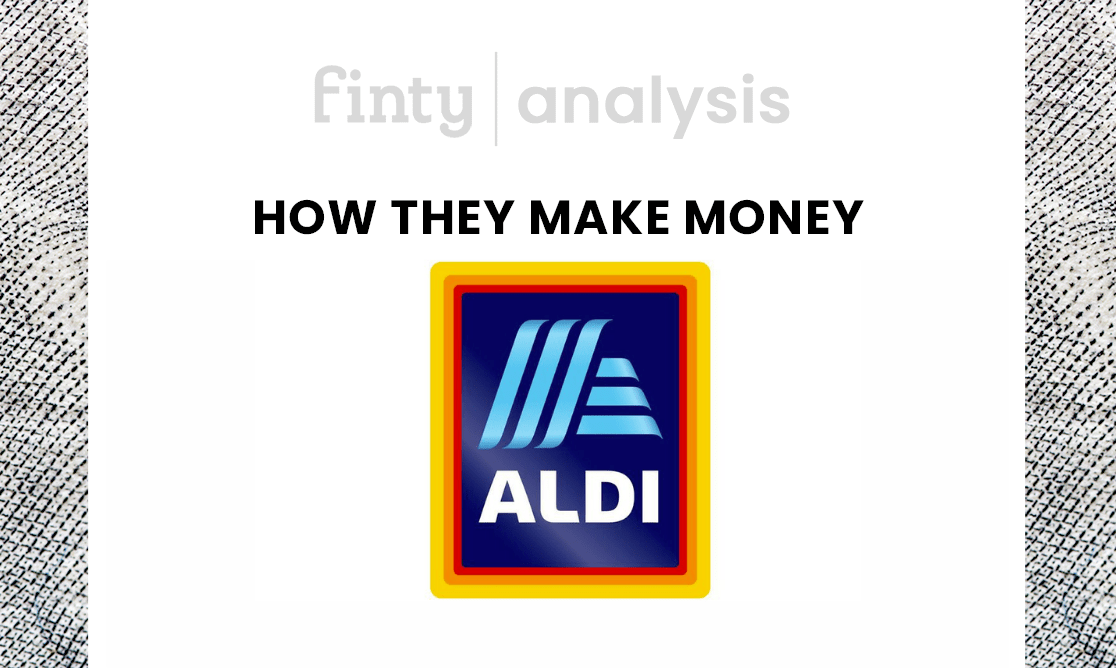- Aldi is the UK's 5th largest supermarket chain with over 920 stores across Britain and an 8% market share.
- Aldi operates a low-cost leadership strategy to bring consumers savings on goods and groceries.
- Aldi makes money by selling consumer products and groceries at affordable prices.
Theo and Karl Albrecht founded Aldi in 1946. The brothers inherited their mother's supermarket business, "Albert Diskont," originally a German-based business.
The brothers split the company in two over a disagreement concerning the sale of cigarettes in its stores, forming Aldi Nord and Aldi Süd.
The brand prospered, opening over 10,000 locations across the UK and EU, spreading its footprint into 18 countries. The company posts annual revenues exceeding €50 billion. Unlike many larger supermarket chains, Aldi management says it has no plans to take the company public.

Coming up next
What does Aldi do?
The split of Albert Diskont in 1960 resulted in Theo Albre owning Aldi Nord, based in Essen, while Karl Albrecht owns Aldi Süd, based in Mülheim.
Aldi's German operations comprise Aldi Nord's 35 regional businesses, operating more than 2,500 stores in north, west, and East Germany.
Aldi Süd has 32 regional businesses with over 1,600 stores in the south and west Germany. Aldi Süd operates retail locations in the US, UK, the EU, China, and Australia.
Aldi Nord operates international locations in the US, EU, the Iberian Peninsula, and the Benelux countries. Aldi Nord operates under the "Trader Joe's" brand in the United States.
How does Aldi work?
Aldi built its reputation as one of the leading supermarket chains by offering a no-frills product range with a restricted inventory holding. Aldi's business model sells its products at the lowest cost possible to the consumer market.
The company keeps its pricing model low by restricting its inventory selection and managing its employee costs. The company doesn't focus on competing with other supermarket chains. Instead, it only sells in-house branded products, avoiding stocking name brands in its stores.
Aldi sells a limited range of groceries under its in-house brand label. Aldi experienced success with its business model due to its strategy of offering consumers convenient shopping experiences alongside rock-bottom prices.
The company consistently beat out other retailers in its market in terms of cost leadership. As a result, they have a strong customer base reliant on the low prices they receive when shopping at Aldi outlets worldwide.
How Aldi makes money
Aldi makes money by offering the consumer market the cheapest option for groceries across all the categories in its stores. Aldi targets the middle-class market because this segment has the greatest price sensitivity to increases in grocery prices.
Essentially, low prices motivate its customer base more than concerns over product quality. As a result, Aldi takes a large percentage of the market share away from other leading UK and EU supermarket chains like ADSA, Tesco, Netto, Lidl, Kwiksave, Penny Market, and Save-A-Lot.
Private Label Brands
Approximately 90% of Aldi's inventory is its in-house brands. The company stocks a limited amount of groceries, focusing on high-volume consumer products rather than niche foods.
If you visit an Aldi location, you'll find most of what you're looking for on your grocery list but none of the exotic or deli products you're used to seeing in other supermarket chains.
Limited Variety Of Goods
The typical UK or US-based supermarket will stock north of 10,000 SKUs on its shelves. However, Aldi refines its offering, limiting its store SKUs to 1,500 items.
Unlike other supermarket chains, Aldi locks its suppliers into long-term contract agreements at the best price they can negotiate, passing the savings along to the consumer.
Its in-house branding system allows it to avoid the prices charged by premium brands while maintaining a high level of quality in its product offering.
Future growth engine
Aldi experienced success with its business model due to its simplified in-store operations. The company focuses on providing consumers with a no-frills shopping experience to keep operating overheads low, passing these savings on to its customers.
Aldi believes the company's future growth remains in maintaining its low-cost leadership pricing model. As a result, it carries a high level of trust in the market and excellent customer retention.
Competitors
Aldi competes with other low-cost supermarket chains in the US and EU. Some of its biggest competitors include the following big-box retailers and supermarket chains.
- Lidl.
- Walmart.
- Woolworths.
- Coles.
- Tesco.
- SuperValu.
- Kroger.

